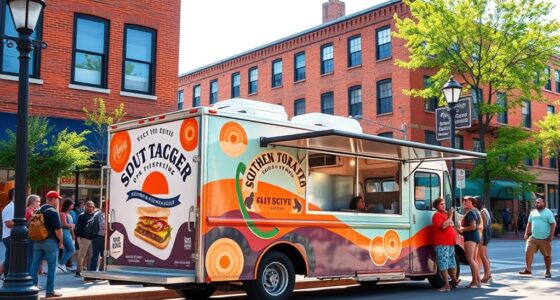When buying a used food truck, start by thoroughly inspecting its overall condition, checking for rust, leaks, and signs of frame damage. Review maintenance records to guarantee regular upkeep and that critical systems work properly. Verify all equipment is functional and meets health and safety standards. Research the truck’s market value to avoid overpaying. Finally, take it for a test drive to assess handling and identify any underlying issues. Following these steps will help you make a smart investment as you explore more tips.
Key Takeaways
- Conduct a comprehensive inspection of the truck’s exterior, interior, and mechanical systems for rust, damage, and operational issues.
- Review maintenance records and service history to ensure consistent upkeep and identify recurring problems.
- Verify that all kitchen equipment functions properly and complies with health and safety regulations.
- Research market values by comparing similar trucks’ prices to determine a fair and competitive offer.
- Perform a test drive to assess vehicle handling, tire condition, and the operation of controls and appliances.
Assess the Truck’s Overall Condition
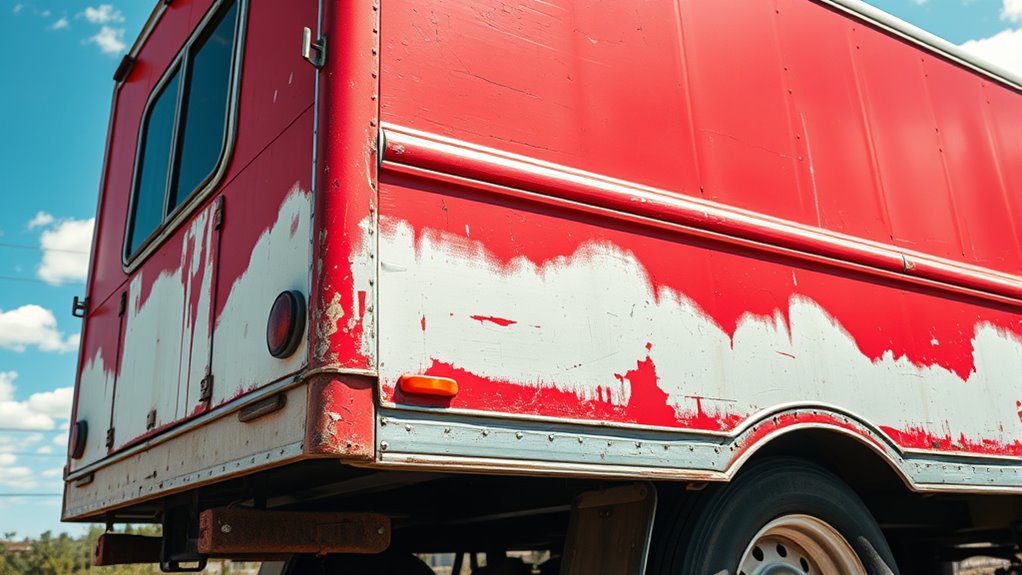
Before purchasing a used food truck, it’s essential to thoroughly assess its overall condition. Check for signs of rust, frame damage, or leaks that could indicate underlying issues. Confirm the engine runs smoothly and the tires are in good shape, as these affect safety and performance. Consider branding considerations—does the truck’s exterior reflect your business identity? A well-maintained appearance can attract customers. Also, verify that the truck complies with licensing requirements in your area; outdated or missing permits could delay your launch. Inspect the electrical and plumbing systems, since repairs can be costly. Overall, a detailed evaluation helps prevent unexpected expenses and guarantees the truck meets your branding and licensing needs, setting a solid foundation for your food business.
Review Maintenance and Service History
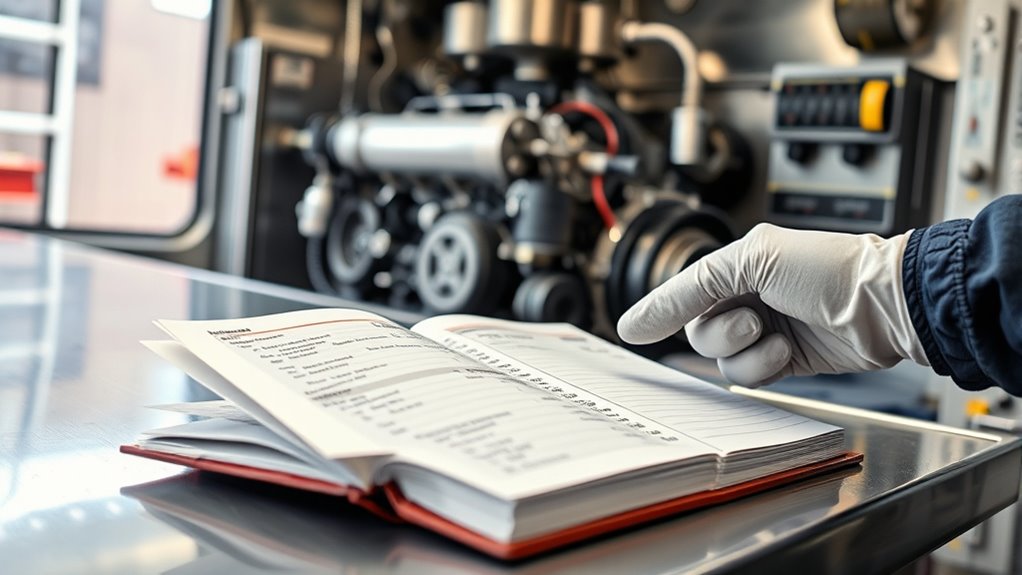
Have you checked the truck’s maintenance and service records? Reviewing these documents helps you identify how well the truck has been cared for and if it’s been regularly maintained. Look for consistent service intervals, especially for critical systems like the engine, refrigeration, and plumbing. Check for any major repairs or recurring issues. While inspecting, pay attention to interior cleanliness, which reflects how the previous owner maintained the space and may indicate overall upkeep. Also, verify branding consistency—ensure decals and signage are well-maintained and align with your branding vision. A detailed service history gives you confidence in the truck’s reliability, saving you potential headaches and costs down the line. Properly maintained trucks are more likely to perform smoothly and last longer. Additionally, understanding the father-daughter bond can remind you of the importance of caring for your investment with love and attention.
Verify Equipment Functionality and Compliance
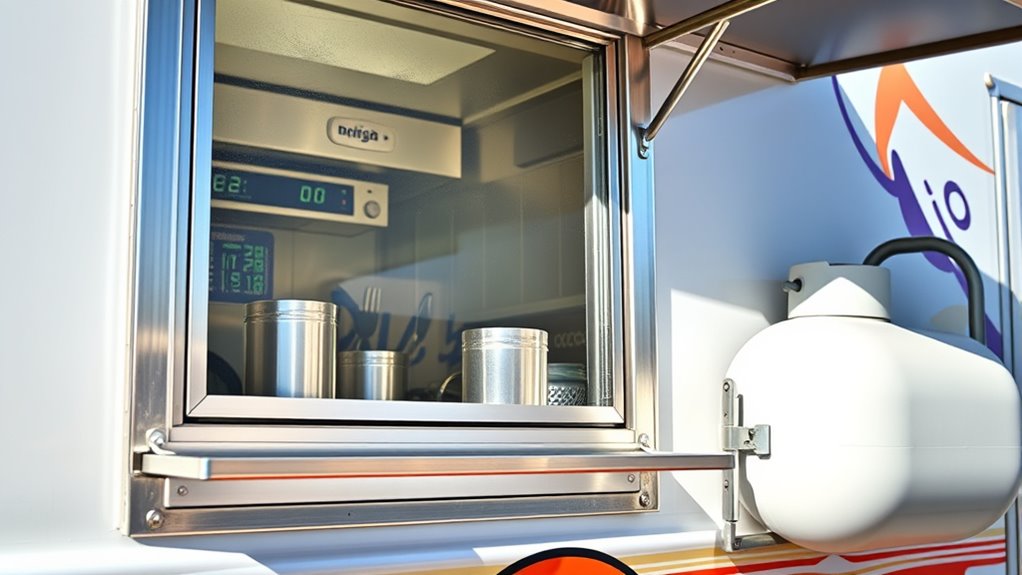
Ensuring all equipment functions correctly and complies with health and safety regulations is essential when buying a used food truck. Start by testing kitchen appliances like ovens, grills, refrigeration units, and sinks to confirm they operate efficiently. Check for any signs of damage or wear that could impact performance. Request compliance documentation from the seller, such as health department certificates and safety inspections, to verify the equipment meets local standards. Confirm that fire suppression systems and ventilation are up to code. Don’t overlook the electrical and gas connections, ensuring they’re safe and properly installed. Additionally, review regulatory compliance documents to ensure the truck adheres to all relevant health and safety standards. By thoroughly verifying functionality and compliance, you minimize future risks and avoid costly repairs, making your investment more secure from the start.
Evaluate the Vehicle’s Market Value
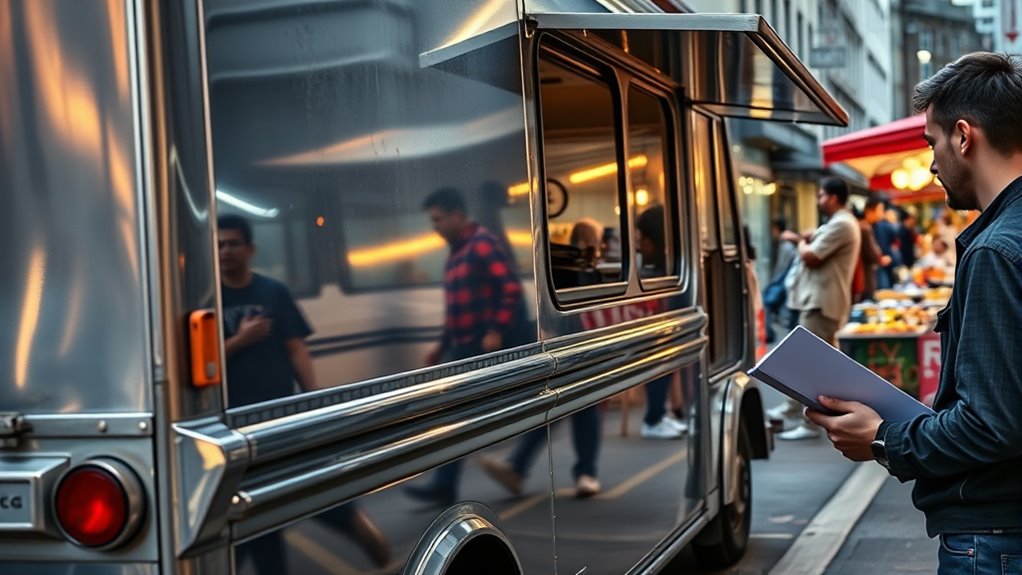
Evaluating the vehicle’s market value is a essential step to guarantee you’re paying a fair price for a used food truck. To do this, research recent sales of similar trucks in your area and online listings. This helps you understand the current market value and avoid overpaying. Use this information to develop a solid pricing strategy, ensuring your offer aligns with the truck’s worth. Keep in mind that factors like age, mileage, condition, and equipment can influence the market value. Comparing prices across sources gives you a clearer picture of fair market value, empowering you during negotiations. Additionally, understanding the essential oils for vehicle health can help maintain the truck’s condition and longevity. Remember, a well-informed price check helps you avoid overpaying and ensures your investment is sound, setting a strong foundation for your new food business.
Conduct a Thorough Inspection and Test Drive

Before finalizing your purchase, it’s crucial to conduct a thorough inspection and take the truck for a test drive. Start by checking the engine performance—listen for unusual noises, smooth idling, and responsiveness. Make certain the engine starts easily and accelerates without hesitation. Next, examine the tire condition; look for uneven wear, cracks, or low tread depth, as these indicate maintenance issues. During the test drive, pay attention to how the truck handles, brakes, and shifts gears. Notice any vibrations or pulling that could signal suspension or alignment problems. Test all controls, including lights, signals, and appliances inside the truck. An all-encompassing inspection combined with a test drive helps you identify potential problems, ensuring you’re making a safe and reliable purchase. Additionally, inspecting the engine’s overall condition can reveal underlying issues that may not be immediately apparent during the test drive.
Frequently Asked Questions
What Are Common Hidden Costs When Buying a Used Food Truck?
When considering the purchase of a used food truck, be aware of hidden costs like maintenance expenses that can add up unexpectedly. You might also face costs for repairs, part replacements, or upgrades to meet health and safety standards. These hidden costs can strain your budget if not anticipated. Always inspect the truck thoroughly and allocate extra for ongoing maintenance to avoid surprises and ensure smooth operations.
How Long Does a Typical Used Food Truck Last With Proper Maintenance?
Imagine a well-loved vintage conversion, its paint gleaming under the sun, still running smoothly. With proper maintenance schedules, a used food truck can last 8-12 years, sometimes longer. Regular oil changes, tire checks, and engine tune-ups keep it in top shape. Your diligent care guarantees it stays reliable, allowing you to serve delicious food day after day, making your investment worth every mile traveled.
Are There Specific Brands or Models Preferred for Durability?
When choosing a used food truck, you should consider brand reputation and model durability. Brands like Ford, Ram, and Mercedes-Benz are known for their reliability and long-lasting performance. Look for models with solid construction, good maintenance history, and positive reviews. By focusing on reputable brands and durable models, you increase your chances of investing in a truck that withstands daily use and keeps your business running smoothly for years.
What Permits and Licenses Are Needed Post-Purchase?
Think of permits and licenses as the secret keys to opening your food truck’s full potential. After buying, you’ll need to navigate food safety regulations and secure health department permits to operate legally. These documents guarantee your truck complies with safety standards, protecting your customers and your business. Without them, your culinary adventure could hit a dead end. So, check local regulations, and get all the necessary permits before hitting the streets.
How Can I Finance a Used Food Truck Purchase?
When you look into financing options for a used food truck, start by researching lenders that specialize in small business or vehicle loans. You’ll need to go through the loan application process, which involves providing financial documents and credit information. Comparing interest rates and repayment terms helps you find the best deal. Once approved, you can secure the funds, making your used food truck purchase smoother and more manageable.
Conclusion
By following these tips, you’ll dodge disaster and snag a food truck that runs like a dream—no more sinking money into a lemon! Think of it as finding the unicorn of food trucks, with everything working perfectly and ready to serve up success. With a keen eye and a little know-how, you’ll turn your food truck dream into a delicious reality faster than you can say “foodie paradise.” Happy truck hunting!





